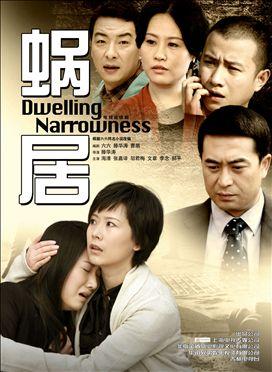Who should be woken up by 'Wo Ju'?
A new TV series "Wo Ju," meaning "a nutshell of a house," has hit the small screen in China. It is based on Liu Liu's novel and has a following of many young people who are living and working in big cities.
 |
|
A poster of hot TV series "Wo Ju" [cqnews.net] |
Lines from the show's protagonist, Hai Ping, vividly depict the daily life of this younger generation: "Every morning when I wake up, a bunch of numbers bounce in front of my eyes: 6,000 yuan for housing loans, 2,500 yuan for daily necessities, 600 yuan for social activities, 500 yuan for transportation fees and 400 yuan for property fees."
According to China Youth Daily on November 19, tecent.com, one of China's major portals, conducted an online poll that attracted about 360,000 Chinese netizens. The survey showed that 80 percent of voters think owning a house is necessary for a happy life.
There is a popular saying in China, "It's pathetic for one to be a home mortgage slave, but it's even more pathetic when one is not qualified to be a mortgage slave." Under this circumstance, more than half of the people polled still believe a house is relevant to happiness. I couldn't help but wonder: what kind of values and livelihood can be reflected from this poll? Author and playwright Liu Liu said, "Everyone who works in the one-square-meter cubicle, pays housing loans, takes the bus and eats box lunches can find him or herself in this drama. A lot of scenes and lines mirror the struggle between dream, reality and the difficulties of love without any disguise."
In the drama, the house is just an attractive factor to raise the audience rating. However, in a society that links owning a home so closely with happiness, the "house" contains sociological significance and has to do with citizens' rights and social justice. Chinese writer Xiao Fuxing compares it to a thorn that pierces both society and our hearts. The show is sensitive to social problems and bravely faces reality.
The pain caused by this "thorn" reveals the people's lack of rights to live a decent life, due to high housing prices. The mortgage slave concept shows that people's incomes cannot bring them happiness. In a report evaluating Chinese cities, issued by the Beijing International Institute for Urban Development, many metropolitan areas received a low grade on livability. The cost of living is high in cities with a high GDP per capita. In Beijing and Shanghai, even though people earn several times more than people in other cities, the price of a house is tens of times higher. If people cannot afford a house, they will feel less content about life.
At the same time, the fact that people rest so much of their happiness on a house reflects the low level of social welfare. According to late American political philosopher John Rawls, the level of social welfare is determined by the poorest people in a society. When their lives are improved, social welfare is developed. Thus our social welfare level should not be judged from those who can afford a house. When everyone can see their own life story in a drama about struggling for a house, is it a good thing?
A TV series can be widely discussed and can even arouse disputes. But the unanimous opinion about the relationship between a house and a happy life should make public policymakers sit up and pay attention to people's needs. The drama is an accusation of problems caused by the housing system reform that started in 1998. The government refuses to define housing as a quasi-public product, as it promotes market principles in the housing market. The policies are beneficial to both the developers and the government. Common people, however, are barely benefited. Thus the government should recognize people's rights and social justices, and draw lessons from the housing reform. It should do this before the drama is forgotten, which will be very soon in such a fast-paced society.
Who should be woken up by the thorn of "Wo Ju"? It is an unavoidable question.
Background:
"Wo Ju" tells the story of a white-collar couple struggling to buy a house in Shanghai. They graduated from renowned Chinese universities and have a 2-year-old child. Yet as they could not afford a house in the city, they end up borrowing money from their relatives. Protagonist Hai Ping's younger sister, Hai Zao, rents an apartment with her boyfriend Xiao Bei, in an attempt to save money for their future house and wedding. Hai Zao then meets Song Siming, a 42-year-old government official, and has an affair with him. Song gives Hai Zao money and other benefits to help her sister's family out. Song is later found guilty of taking bribes and dies in a car accident. Hai Zao aborts Song's child. Hai Ping finally becomes a home owner and begins her new career as a Chinese teacher.
(This post was first published in Chinese on November 20, 2009 and translated by Ren Zhongxi.)
 0 Comments
0 Comments






